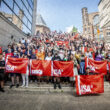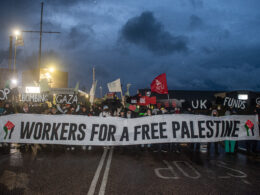By Conor Burke
As the impact of the cost of living crisis continues to bite ordinary workers and families, news emerges that 18 CEOs in some of Ireland’s biggest companies took home an average of €3.46 million in pay last year alone. This amounts to a 27% increase on previous figures. Luckily for them, they’re staying ahead of the inflation rates they’re passing on to their customers!
These companies include CRH and Kingspan (building materials), Bank of Ireland and AIB (banks), Glanbia and Kerry Group (food production), as well as the likes of Paddy Power bookmakers and Ryanair. All of these companies are making exorbitant profits during this cost of living crisis.
In fact exploiting crises – whether the housing crisis in the case of construction companies, or the energy crisis in the case of the electricity companies – is the best thing these companies can hope for. In the latter case, energy providers such as Electric Ireland, Board Gáis, Energia etc have all increased their pricing structures way above the increase seen in fossil fuel costs which are being attributed to the war in Ukraine.
Ripping off workers
This is where the profits are coming from to pay these CEOs such massive salaries and similarly for dividends to shareholders. Effectively, it’s the extra euros that workers and families are being forced to pay for goods and services, and it’s on top of the exploitative working conditions and workers’ remuneration stagnating way behind the inflation rates.
What we see in these record profits and CEO salary hikes is more wealth being transferred from those at the bottom of the social class structure, workers, to those at the top, capitalists.
Throughout the Covid 19 pandemic ordinary workers in health, retail, transport etc. were held up for the vital role they play in keeping society going, because without these workers the system would have come to a grinding halt. Yet now as things begin to return to normal we see the indifference of the capitalist system to these workers once again. Of course this is just a return to normality under capitalism, which cannot let it be understood that capitalist society depends entirely on workers to keep everything going.
Capitalism likes to perpetuate the false idea that it is CEOs and entrepreneurs that are the real dynamic factor, and that without their ‘genius’ and drive no innovation would occur. The truth, however, is that it is ordinary workers that are the source of most innovation within the workplace as well as being the source of surplus value (by working more than they’re paid for) on which all companies’ profits depend.
Turn the tide in the class war
One could be forgiven for thinking that what we are seeing here is a calculated money grab by the capitalist class ahead of the impending global recession, of which even right-wing economic analysts such as at the IMF, the World Bank and the Financial times have all warned, and revised their growth forecasts accordingly.
Capitalists will of course try to shield themselves from the worst effects of their crisis ridden system by transferring the burden onto the shoulders of the working class. This is why workers need to organise now to defend their living standards. That means coming together to decide on a plan of action in every workplace and community. It also means organising in the political sphere. The power of the working class rests in its ability to use its collective strength to fight for its interests, when it does this there is no more powerful force in society. It is by these means that we can win the measures needed to tackle the multiple crises facing society – economic, social and ecological.
A socialist programme for public ownership of the key sectors of the economy, such as those at the heart of the cost of living crisis, is now essential. For example, energy companies should be nationalised under workers’ control and run on a not for profit basis – to bring costs down and step up the transition to 100% renewables. Similarly the housing crisis could be resolved by nationalising the construction industry and building public homes.
These are the kinds of policies we need, which could transform society by using the wealth and resources that workers create to meet the needs of the majority and not for the profits of the few.












